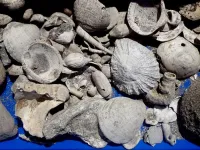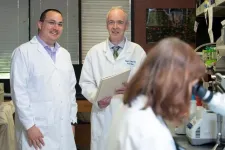(Press-News.org) Indigenous females living "off reserve" face many disparities in health care access, use and unmet needs, found new research in CMAJ (Canadian Medical Association Journal) https://www.cmaj.ca/lookup/doi/10.1503/cmaj.221407.
The study included 2902 First Nations, 2345 Métis, 742 Inuit and 74 760 non-Indigenous females of reproductive age (aged 15–55 years) obtained from the Canadian Community Health Survey from 2015 to 2020, including 4 months during the COVID-19 pandemic.
"We found that 'off-reserve' First Nations, Métis and Inuit females reported higher morbidity and continue to face various disparities in health care access, use and unmet needs," writes Sebastian Srugo, a researcher with the Public Health Agency of Canada. "Specifically, fewer Indigenous females reported having access to a regular health care provider, especially in the territories and Prairies; more waited longer for an appointment; and more used hospital services for nonurgent care."
The authors, who include patients and members of community organizations on the Indigenous Advisory Committee, note that racism and lack of equity are widespread and contribute to disparities in health access and higher rates of illness among Indigenous females. A key issue is having access to a consistent primary care provider for continuity of care.
"To alleviate these disparities, our Indigenous advisors recommend that Canada leverage more accessible and culturally competent health care providers and that survey developers try to fill outsized gaps in Indigenous health data," the authors conclude. "Future work should monitor these disparities over time and fill large gaps in our findings, such as by ascertaining data on 'reserves.'"
END
Indigenous females face disparities in health care in Canada
2023-08-28
ELSE PRESS RELEASES FROM THIS DATE:
Researcher finds inspiration from spider webs and beetles to harvest fresh water from thin air
2023-08-28
A team of researchers is designing novel systems to capture water vapour in the air and turn it into liquid.
University of Waterloo professor Michael Tam and his PhD students Yi Wang and Weinan Zhao have developed sponges or membranes with a large surface area that continually capture moisture from their surrounding environment.
Traditionally, fresh water for consumption is collected from rivers, lakes, groundwater, and oceans (with treatment). The current technologies Dr. Tam is developing are inspired by nature to harvest water from alternative sources as the world is facing ...
UEA researchers develop new tool to reduce stroke risk
2023-08-28
Peer reviewed – observational study - humans
Researchers at the University of East Anglia have developed a new way of identifying patients at risk of an irregular heartbeat, known as ‘atrial fibrillation’.
While not life threatening, the condition increases people’s risk of having a transient ischaemic attack (TIA) or stroke by up to five times.
A new study, published today, reveals four specific factors that can predict which patients will have atrial fibrillation.
These include older age, higher diastolic blood pressure and problems with both the coordination ...
No evidence grammar school systems are best for the brightest, study of 500,000 pupils reveals
2023-08-28
The UK’s brightest pupils’ chances of getting top GCSE grades are actually lower in grammar schools than in comprehensives, according to a major new piece of research.
The study, which was based on test results and other information from all pupils in England, challenges the common belief that high achievers do better in more academic schools.
Findings, published in the peer-reviewed journal Educational Review, demonstrate those with the highest scores at age 11 were less likely to achieve ...
Auckland wastewater pipe dig reveals 'fossil treasure trove'
2023-08-27
A new New Zealand Journal of Geology and Geophysics paper out today describes the 266 fossil species as one of the richest and most diverse groups of three-million-year-old fauna ever found in New Zealand. At least ten previously unknown species will be described and named in future research.
Fossil treasure trove from Auckland’s Mangere Wastewater Treatment Plant
In 2020, when Auckland’s Watercare were excavating two huge vertical shafts for a major upgrade of the major pipeline that brings raw sewage for treatment from the central city they dug through an ancient shell bed. Auckland paleontologist Bruce Hayward likened ...
Study: Individuals feel sex-specific symptoms before impending cardiac arrest
2023-08-27
Investigators from the Smidt Heart Institute at Cedars-Sinai are one step closer to helping individuals catch a sudden cardiac arrest before it happens, thanks to a study published today in the peer-reviewed journal Lancet Digital Health.
The study, led by sudden cardiac arrest expert Sumeet Chugh, MD, found that 50% of individuals who experienced a sudden cardiac arrest also experienced a telling symptom 24 hours before their loss of heart function.
Smidt Heart Institute investigators also learned that this warning symptom was different for women than it was for men. For women, the most prominent symptom of an impending sudden cardiac ...
Scientists zoom in on the Asian monsoon season using satellite data
2023-08-26
Tokyo, Japan – Scientists from Tokyo Metropolitan University and other institutes have studied new satellite data showing the diameter of rain droplets and the distribution of heavy ice in the atmosphere worldwide. They focused on the Asian monsoon region, finding larger droplets and more heavy ice precipitation on land before the actual monsoon season. Their findings shed new light on the features of the pre-monsoon season, such as more intense precipitation and lightning, potentially informing better weather prediction.
As adverse rainfall events rock the world, scientists are trying to understand the mechanism ...
Observation of metal healing itself confirms Texas A&M researcher’s prediction
2023-08-26
A microscopic crack grew in a very small piece of platinum when placed under repetitive stretching. The experiment, designed to study fatigue crack growth, continued as predicted for a while before something unexpected happened. The crack stopped growing and instead began to get shorter, effectively “healing” itself.
A group of researchers at Sandia National Laboratories made this surprising observation while conducting fracture experiments on nanocrystalline metals. The findings were recently published in the journal Nature.
It ...
NIH selects undergraduate winners of 2023 DEBUT Challenge for impressive medical device designs
2023-08-25
The National Institutes of Health and the higher education non-profit VentureWell have selected 10 winners and five honorable mentions of the Design by Biomedical Undergraduate Teams (DEBUT) Challenge, who are set to receive prizes totaling $145,000. The awards will be presented to the winning teams during the annual Biomedical Engineering Society conference held Oct. 11-14, 2023.
Now in its 12th year, the DEBUT Challenge calls on teams of undergraduate students to produce technological ...
UofL researchers land nearly $12 million to study connection between microorganisms and disease
2023-08-25
LOUISVILLE, Ky. – University of Louisville researchers have received $11.7 million to study microorganisms throughout the body, including the mouth. What they find could lead to better understanding and treatment of a range of chronic conditions.
The five-year grant from the National Institutes of Health (NIH) is an extension of a Center of Biomedical Research Excellence (COBRE) grant awarded in 2018 to study the connection between those microorganisms — such as bacteria, yeasts, fungi, viruses and protozoans — and disease. The work could lead to discoveries in, among others, Alzheimer’s disease, heart disease, diabetes, periodontitis ...
Survey: Tourists’ long-term plans more uncertain under climate change
2023-08-25
North Carolina State University researchers found in a new study that while many tourists visiting a mountain destination in southern Mexico wouldn’t change their near-term plans to visit due to climate change, more than two-thirds said they would or might change their plans by 2060 under more drastically changed conditions.
In addition, researchers also found that 70% of those surveyed would change the length of their stay in response to climate change by 2060, and some indicated they’d shift the timing of their visit. The findings, published in a ...




